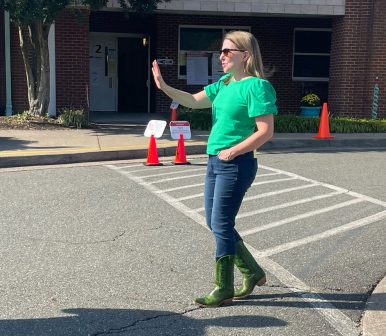Democrats sweep Va. General Assembly
Youngkin faces reinforced 'blue wall'; abortion seen as motivating factor

Democrats Del. Schuyler VanValkenburg, right, and Del. Rodney Willett celebrate at an election party Tuesday Nov. 7, 2023, in Glen Allen. (AP Photo/Steve Helber)

Democrats Del. Schuyler VanValkenburg, right, and Del. Rodney Willett celebrate at an election party Tuesday Nov. 7, 2023, in Glen Allen. (AP Photo/Steve Helber)
Democrats sweep Va. General Assembly
Youngkin faces reinforced 'blue wall'; abortion seen as motivating factor
Updated Nov. 8
Democrats regained control of the Virginia Senate and the House of Delegates in Tuesday’s elections, likely putting a damper on Republican Gov. Glenn Youngkin‘s legislative agenda and potential 2024 presidential aspirations. As of 11:45 p.m. Tuesday, according to the Virginia Public Access Project, Democrats won 21 out of 40 seats in the state Senate and 51 seats in the House, which has been held by Republicans for the past two years.
This electoral outcome will likely prevent Youngkin from passing most of his agenda, including placing a 15-week limit on abortions, which was a significant issue for many voters, particularly Democrats and women. It may also at least temporarily lessen his national standing, as he failed to deliver a red wave as he did during his 2021 election, which saw Republicans elected to the state’s top three offices and the GOP take control of the House.
The election also sets up Virginia House Minority Leader Don Scott Jr. of Portsmouth to become the first Black speaker of the House in the Virginia legislature‘s 400-plus-year history, replacing GOP Speaker Todd Gilbert, who has presided over the House of Delegates since January 2022.
Virginia’s blue wave followed a national trend, as Ohio voters approved ballot measures guaranteeing abortion access and legalizing recreational marijuana use. Meanwhile, in Kentucky, voters granted a second term to Democratic Gov. Andy Beshear, who had campaigned on making Kentucky’s abortion laws less restrictive.
Republicans won 19 Virginia State Senate seats. The Associated Press called a Williamsburg-area nailbiter at 2:15 p.m. Wednesday in favor of GOP challenger Danny Diggs, who defeated Democratic incumbent Monty Mason. The final count saw Diggs with 32,764 votes, or 50.69% of the total, and Mason with 31,742 votes.
In the House, Republicans held 48 seats as of 2:45 p.m. Wednesday, with one race not yet called. Republican Del. Kim Taylor’s race against Democrat Kimberly Pope Adams in Petersburg and Dinwiddie County was too close to call, with Taylor ahead with 50.23% of the vote and less than a 200-vote margin over Adams. Taylor declared victory late Tuesday, but Adams had not conceded as of Wednesday afternoon.
Two other close House races went in Republicans’ favor: District 57’s contest in Henrico County between Democrat Susanna Gibson and Republican David Owen, a race that received national press following revelations that Gibson had performed sex acts with her husband on a live streaming pornography website while soliciting tips from viewers. Owen won with 51.16% of the vote, gaining 17,878 votes to Gibson’s 16,912. In James City County and Williamsburg, Republican Del. Amanda Batten won a third term with 51.93% of the vote over Democrat Jessica Anderson.
Voters went to the polls Tuesday to fill all 140 General Assembly seats. Many candidates were new faces or, at least, less experienced than those who previously filled the legislature, thanks to the December 2021 redistricting process, which redrew political districts without prioritizing the residential addresses of incumbents. That led to an unprecedented wave of retirements and some primary defeats of longtime legislators.
Blue wave
In several of the most hotly contested races, Democrats came up victorious Tuesday night.
In Loudoun and Fauquier counties, Democrat Russet Perry, a former CIA officer and prosecutor, won Senate District 31 with 52.5% of the vote as of 10:28 p.m. Tuesday, according to unofficial results from the Virginia Department of Elections. She defeated Republican Juan Pablo Segura, a health care tech entrepreneur who founded a local doughnut chain. Segura received 40,835 votes compared to Perry’s 45,350 votes, and the Associated Press estimated 92% of votes had been counted by 10:25 p.m., when it called the race.
Segura conceded about an hour later. “We were outspent but not outworked,” he said in a statement. “We knocked on more than 100,000 doors and talked to many, many thousands of voters about their hopes, dreams and concerns. … I also want to congratulate Russet Perry on a hard-fought race, and I wish her the best of luck in representing this special place. Lessons are learned in losses, but I heard very clearly the deep desire from so many in this district for better representation from their government.”
Both were first-time candidates, and Perry outpaced all other state legislature candidates in fundraising more than $6 million by Oct. 31, while Segura raised a bit more than $5 million.
Del. Danica Roem, another Democratic delegate seeking a Senate seat, beat Republican candidate Bill Woolf for the 30th District seat in Manassas and part of Prince William County with 51.51% of the vote. Roem, who became the nation’s first openly transgender state lawmaker upon her 2017 election to the House of Delegates, won 29,713 votes to Woolf’s 27,794 as of 10:13 p.m., according to unofficial results from the Virginia Department of Elections. A former journalist, Roem currently represents House District 13, which includes Manassas Park and part of Prince William County. Woolf was formerly a detective with the Fairfax County Police Department.
“I’m grateful the people of Virginia’s 30th Senate District elected me to continue representing my lifelong home of western Prince William County and greater Manassas,” Roem said in a statement. “The voters have shown they want a leader who will prioritize fixing roads, feeding kids and protecting our land instead of stigmatizing trans kids or taking away your civil rights.”
In another key seat, Democratic Del. Schuyler VanValkenburg won Senate District 16 in western Henrico County with 52.69% of the vote as of 9:38 p.m. Tuesday, according to unofficial results from the Virginia Department of Elections. The Associated Press estimated more than 95% of votes had been counted by 9:33 p.m.
VanValkenburg received 27,469 votes to Republican Sen. Siobhan Dunnavant’s 24,544 as of 9:43 p.m. Although the incumbent, Dunnavant was redistricted into a slightly bluer district than her previous district, which had included part of Hanover County. The race was considered a key contest to watch this year and saw some of the largest fundraising among Virginia’s legislative races.
Numerous incumbents retired or lost primaries after being drawn into the same districts as other incumbents. Particularly in the state Senate, longtime party leaders chose to bow out rather than face a primary battle, leaving younger and less moderate candidates running for office this fall.
Although 2023 was, at least in name, an off-off election year with no presidential or statewide races topping the ballots, legislative candidates in competitive districts saw a massive influx of money and heated rhetoric from both parties. High stakes, including Virginia’s status as the only Southern state without significant abortion restrictions, were riding on whether either party can take control of the commonwealth’s legislature, which is currently split, with Republicans running the House of Delegates and Democrats controlling the state Senate.
Although his name wasn’t on ballots, Youngkin’s presidential hopes also rested on Tuesday’s results, drawing national attention. If Republicans had won back control of the General Assembly, Youngkin could have mounted a plausible last-minute campaign for the 2024 GOP presidential nomination, politicos forecast. But with Democrats regaining power of just one of the legislative bodies, Youngkin will be unlikely to pass much of his stated agenda through the General Assembly, including a ban on abortions after 15 weeks and tax cuts for corporations, with the blue wave likely putting any presidential ambitions he has on hold, at least for 2024.
In a press conference Wednesday, Youngkin called the outcome “a razor-thin set of decisions” made by voters and noted the commonwealth’s recent history of changes in party control, downplaying Republicans’ disappointing results. “I think what that reflects is that we are a state that is very comfortable working together, working across party lines to get things done.”
In response to a reporter’s question about his presidential ambitions, Youngkin was predictably coy. “I have answered this question the same way for a long time. I am focused on Virginia. I have been in Virginia. My name is not on the ballot in New Hampshire. I have not been in Iowa. I am not in South Carolina. I am in Virginia, and I look forward to staying focused on Virginia, just like I have been.”
With issues such as parental influence in schools, reproductive rights, cannabis retail sales and corporate tax cuts in the balance, Democratic- and Republican-affiliated PACs sank millions into legislative campaigns this year. According to an Associated Press story, money raised by Virginia State Senate and House of Delegates candidates this year eclipsed totals from 2019. As of early November, Senate candidates had raised $80.8 million, compared to $53.6 million at the same point in 2019, and House candidates raised $77.5 million, compared to $67.5 million in 2019.
Both Republicans and Democrats emphasized the historic nature of the election, which could determine the state’s abortion, clean energy, education and tax policies for decades to come — although the parties differ widely on their overall goals.
Youngkin and state Republicans advocated to enact limits on abortions after 15 weeks, a rollback of Virginia’s current laws allowing abortions up to 26 weeks, although, in the third trimester, three doctors must sign off on the procedure as medically necessary. Democrats, meanwhile, have argued that the 15-week limit, posed as a reasonable compromise by Republicans, would be the first of many restrictions on abortion following the U.S. Supreme Court’s overturning of Roe v. Wade last year.
Parents’ involvement in their children’s K-12 education remained a hot topic, carrying on from Youngkin’s winning gambit in 2021’s gubernatorial race, when he focused attention on a Loudoun County sexual assault case, in which a 14-year-old male student sexually assaulted a female student in a school restroom and then was allowed to transfer to another high school, where he abducted and assaulted another student. The teen was later convicted in juvenile court, and in September, Youngkin pardoned one of the victims’ fathers, who had been arrested and charged with obstruction of justice and disorderly conduct at a county school board meeting.

Last week, the governor issued an executive order mandating that school districts inform parents within 24 hours of any overdoses involving their schools, after Loudoun County Public Schools waited more than 20 days to report that nine high school students had overdosed on pills suspected of containing fentanyl. Youngkin also has ordered schools to inform parents if their children use a different gender identity at school than is their assigned sex. He has also required that students participate in sports and use bathrooms based on their assigned sex, a mandate some school systems have refused to enforce — particularly in Northern Virginia.
A Washington Post-George Mason University Schar School of Policy and Government poll, conducted Oct. 11-16, showed a divided commonwealth going into the elections, with 47% of registered voters saying they would vote for a generic Democrat for delegate, and 43% for a Republican. Meanwhile, 70% of voters said education was the most important issue for them this year, followed by the economy at 68% and abortion rights at 60%.
According to VPAP, 789,848 people voted early across the state as of Monday, with Democratic voters making up about 60% of early voters, compared with about 40% for Republicans.
Virginia Department of Elections Commissioner Susan Beals said Tuesday afternoon that some localities’ ballots were longer than usual, with county supervisors, sheriffs and other local offices included, as well as state legislators. There was an issue with poll books reported at some Chesterfield County locations — but those were resolved by early afternoon, Beals said. At Williamsburg’s Matoaca precinct, where locally registered William & Mary students can vote, the Richmond Times-Dispatch reported “long lines all day.”
In Virginia Senate District 16 in western Henrico County, voter turnout was steady overall with slight fluctuations throughout the morning in at least two precincts.
At about 12:50 p.m., the Echo Lake Elementary School polling location in the Coalpit precinct in Glen Allen had received 791 votes. “It’s been steady since we opened. There’s some periods where … we had a good little crowd for a while,” said Maurice Talley, a volunteer poll worker at the elementary school.
Incumbent Republican state Sen. Siobhan Dunnavant stopped at the school to greet voters as she campaigned at multiple polling locations during her ultimately unsuccessful battle against her Democratic challenger, state Del. Schuyler VanValkenburg. Voters who recognized Dunnavant or her name after an introduction were enthusiastic, she said. “They’re excited to be turned out. They say, ‘You’ve got this. This is great,’” she said.
Angie Madison, a Glen Allen Pilates instructor who said she isn’t loyal to one party and goes back and forth depending on the issues, said she voted for Democratic candidates Tuesday. “I’m trying to do my part by voting Democratic and trying to vote for abortion rights and all that stuff,” she said. “It feels like we’re going back in time versus forward in time, so I want to go forward in time.”
High stakes, high rollers
According to VPAP, the following state Senate candidates raised the most money, as of Oct. 31:
- Democrat Russet Perry — $6,071,414
- Republican Sen. Siobhan Dunnavant — $5,104,711
- Democrat Del. Schuyler VanValkenburg — $5,069,960
- Democrat Sen. Monty Mason — $5,043,533
- Republican Juan Pablo Segura — $5,003,665
Among delegate candidates, Democrats dominated fundraising:
- Democrat Joshua Cole — $3,816,605
- Democrat Michael Feggans — $3,255,257
- Democrat Josh Thomas — $3,198,811
- Republican Del. Karen Greenhalgh — $2,778,182
- Democrat Kimberly Pope Adams — $2,706,971
Not surprisingly, familiar names were among the biggest donors in the elections. The Virginia Senate Democratic Caucus donated $7.5 million for Democratic candidates, while Youngkin’s Spirit of Virginia PAC doled out $4.8 million to GOP candidates. Dominion Energy and the Clean Virginia Fund — a fund created by Charlottesville millionaire Michael Bills to dilute the political influence of Dominion — gave just over $4 million each to Senate candidates this year.
In the House races, the House Democratic Caucus donated $10.8 million, while the Republican Commonwealth Leadership PAC gave $4.1 million. Dominion and the Clean Virginia Fund made donations of $3.8 million and $3.6 million, respectively.
For those watching broadcast television in the days before the elections, negative ads ran thick and fast in competitive districts, and Youngkin blazed a trail across the state to get out Republican voters to the polls for early voting in October and early November. Democrats, meanwhile, called on Maryland Gov. Wes Moore, Department of Transportation Secretary Pete Buttigieg and gun-control advocate David Hogg to get out the vote.
In Richmond’s casino battle redux, Churchill Downs and Urban One, corporate backers of the proposed $562 million Richmond Grand Resort & Casino, sank more than $10 million into their campaign to pass the city’s second casino referendum, almost four times the amount spent in 2021 and more than for any individual candidate running this year. Ultimately, the second referendum failed by a 58% to 42% margin.



















